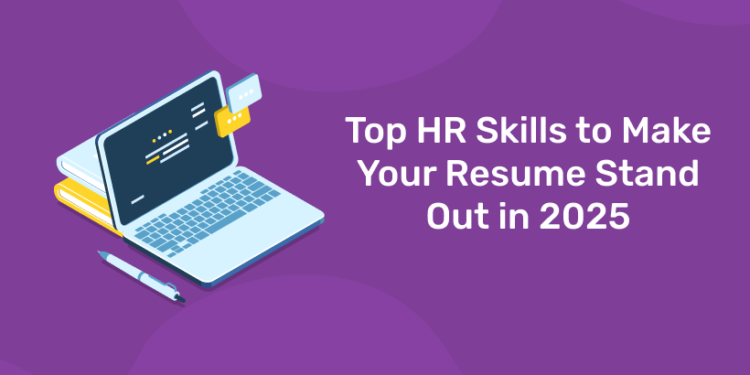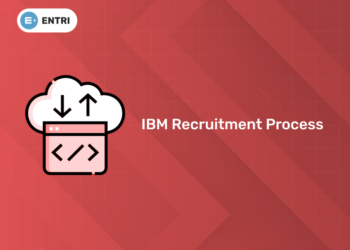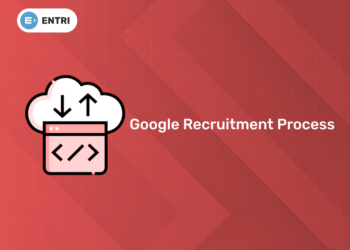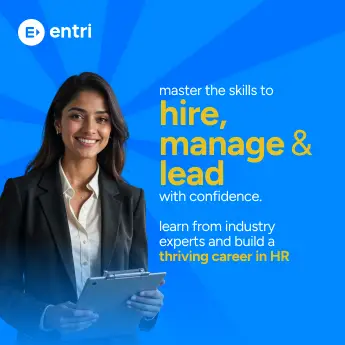Table of Contents
Introduction
HR Skills to Make Your Resume Stand Out. The HR landscape is changing fast in 2025. With artificial intelligence, remote work, and changing workplace dynamics re-shaping how businesses operate, HR professionals need to adapt and upskill to stay relevant. Being the right combination of skills on the CV is crucial to stand out in today’s job market for either an experienced HR professional who is looking up the career ladder or someone trying to get into the profession.
There is a growing demand for skilled HR professionals, as the Bureau of Labor Statistics has predicted steady growth in HR roles through 2025 and beyond. However, this growth is accompanied by increased expectations and demands on HR professionals. Today‘s HR professionals must be business partners in organisational success, bringing together traditional knowledge of HR with modern technical skills and advanced people management skills.
Top HR Skills to Include
1. Digital HR and HRIS Expertise
. Key areas are:
- Experience with popular HRIS platforms like Workday, SAP SuccessFactors or BambooHR
- HR analytics and reporting tools
- AI powered recruitment and talent management platforms
- Digital onboarding systems and employee experience platforms
If you want to develop these technical skills, Entri’s HR Management Course in Kerala offers hands on training with latest HR technologies and systems.
2. Data Analytics and Metrics
Data driven decision making has become the norm in HR. Key skills are:
- Collecting and analyzing HR metrics
- Workforce analytics
- Creating data visualizations
- Understanding KPIs and their impact
- Predictive analytics for workforce planning
3. Employee Experience and Engagement
With retention and workplace satisfaction being the focus, skills in employee experience are:
- Design and implementation of engagement programs
- Pulse surveys and feedback tools
- Employee wellness initiatives
- Remote and hybrid work
- Inclusive workplace cultures
4. Compliance and Risk
Keep up to date with:
- Latest employment laws and regulations
- Health and safety
- Internal audit
Become an HR Expert – Enroll in Our HR Management Course Today!"
Unlock the secrets to effective Human Resource Management with our expert-led course! Learn recruitment, employee relations, performance management, and more to build a thriving workplace. Start your journey toward a successful HR career today!
Know MoreSoft Skills for HR Professionals
1. Communication
- Written communication
- Verbal communication to all levels
- Active listening
- Presentation
- Cross cultural
- Virtual communication
2. Change Management
With continuous change in the organisation, change management skills are a must:
- Leading transformation initiatives
- Change impact assessment
- Stakeholder management
- Resistance management
- Implementation planning and execution
3. Emotional Intelligence
High EQ is required for HR roles:
- Empathy
- Conflict resolution
- Self awareness
- Networking
- Situational awareness
- Time management
4. Problem Solving and Critical Thinking
- Analysis
- Decision making
- Planning
- Innovation
- Crisis
HR Skills for Specific Roles
HR Generalist Roles
Broad knowledge areas:
- Recruitment and selection
- Employee relations
- Benefits administration
- Performance management
- Training and development
- Basic employment law
HR Business Partner Roles
Strategic capabilities:
- Business acumen
- Strategic planning
- Consulting skills
- Change management
- Leadership development
- Organisational design
Recruitment Specialists
Specialised recruiting skills:
- Sourcing strategies
- Employer branding
- Interview techniques
- Assessment methods
- Candidate experience management
- ATS expertise
How to Show HR Skills
1. Measure Your Impact
Instead of listing skills, show how they worked:
- “Improved employee engagement scores by 28% with wellness programs”
- “95% compliance rate in mandatory training programs”
2. Use Industry Terminology
Include industry keywords in your resume:
- HRIS systems
- Industry certifications
- Methodologies
- Technical tools and software
- Compliance standards
3. Show Continuous Learning
Demonstrate your professional development:
- Recent certifications
- Professional memberships
- Workshops
- Industry conferences
- Online courses and training
For HR professionals looking to upskill their HR capabilities, Entri’s HR Management Course covers all the essential areas of modern HR management. The course combines theory with practical application to prepare you for the HR landscape today.
4. Show Project Management Skills
Showcase your project leadership:
- Change projects
- System deployments
- Policy creation
- Training programs
- Culture projects
Become an HR Expert – Enroll in Our HR Management Course Today!"
Unlock the secrets to effective Human Resource Management with our expert-led course! Learn recruitment, employee relations, performance management, and more to build a thriving workplace. Start your journey toward a successful HR career today!
Know MoreModern HR Skills to Get
1. Remote Work
Develop:
- Virtual team management
- Remote onboarding
- Digital tools
- Virtual culture
- Remote performance management
2. AI and Automation in HR
Stay up to date:
- AI recruitment tools
- Automated onboarding
- Chatbots for employee services
- Predictive analytics
- Machine learning in HR
3. Diversity, Equity, Inclusion (DEI)
Showcase:
- DEI strategy
- Inclusive recruitment
- Bias prevention
- Cultural competency
- Equal opportunity
Conclusion
If you want to upskill and stay ahead in the job market professional development is key. Entri’s HR Management Course in Kerala covers all the skills mentioned in this article. The course gives hands on experience with modern HR tools, expert guidance and practical training as per industry needs.
Remember the most successful HR professionals are those who are committed to continuous learning and adaptation. Whether you are just starting your HR career or looking to move up to a senior role, investing in your skill development through courses like Entri’s HR Management Course can help you stand out in today’s job market.
Apply now for Entri’s HR Management Course. Online and offline options available. Industry experts. Modern curriculum. Get skilled and get ahead.
Become an HR Expert – Enroll in Our HR Management Course Today!"
Unlock the secrets to effective Human Resource Management with our expert-led course! Learn recruitment, employee relations, performance management, and more to build a thriving workplace. Start your journey toward a successful HR career today!
Know MoreFrequently Asked Questions
What are the most essential technical skills needed for HR professionals in 2025?
In 2025, HR professionals need strong technical proficiency in several areas. First and foremost is expertise in Human Resource Information Systems (HRIS) like Workday, SAP SuccessFactors, and BambooHR. They should also be comfortable with HR analytics and reporting tools, AI-powered recruitment platforms, and digital onboarding systems. Additionally, proficiency in data visualization tools and predictive analytics for workforce planning has become crucial. HR professionals should be able to leverage these tools to streamline processes, make data-driven decisions, and improve overall organizational efficiency.
How can I demonstrate measurable impact in my HR role when applying for new positions?
Instead of simply listing skills on your resume, focus on quantifiable achievements and specific outcomes. For example, highlight metrics like “decreased time-to-hire by 35% through implementing AI-powered recruitment tools” or “improved employee engagement scores by 28% through innovative wellness programs.” Document specific projects you’ve led, including system deployments, policy creation, or culture initiatives, and their measurable results. Include compliance rates, cost savings, efficiency improvements, and other relevant KPIs that demonstrate your concrete impact on the organization.
What role does employee experience and engagement play in modern HR, and how can I develop these skills?
Employee experience and engagement have become central focus areas in modern HR. This involves designing and implementing comprehensive engagement programs, conducting regular pulse surveys, managing feedback tools, and developing employee wellness initiatives. Skills in this area should include expertise in managing remote and hybrid work environments, creating inclusive workplace cultures, and understanding the various touchpoints of the employee journey. To develop these skills, focus on learning about modern engagement tools, studying successful case studies, and gaining practical experience in implementing engagement strategies.
How important is data analytics in HR, and what specific analytics skills should I develop?
Data analytics has become fundamental to HR decision-making in 2025. Key skills include collecting and analyzing HR metrics, understanding workforce analytics, creating meaningful data visualizations, and using predictive analytics for workforce planning. HR professionals should be able to interpret KPIs and their impact on business outcomes. This includes understanding retention rates, recruitment metrics, performance indicators, and engagement metrics. Developing skills in statistical analysis, data visualization tools, and predictive modeling will be valuable for career advancement.
What compliance and risk management skills are essential for HR professionals today?
Modern HR professionals must stay current with various compliance and risk management areas. This includes thorough knowledge of latest employment laws and regulations, health and safety protocols, and data privacy requirements (such as GDPR and CCPA). Skills in risk assessment and mitigation are crucial, as is the ability to conduct internal audits. HR professionals should also understand international labor laws if working with global teams and be able to develop and implement compliance training programs.
How can I develop the change management skills required for senior HR roles?
Change management has become a critical skill set for HR professionals, especially those aspiring to senior positions. This involves developing expertise in leading transformation initiatives, conducting change impact assessments, and managing stakeholders effectively. Key areas to focus on include resistance management, implementation planning, and execution of change programs. Practical experience can be gained through leading organizational change projects, participating in transformation initiatives, and studying change management methodologies.
What are the most important soft skills for HR professionals, and how can I improve them?
Essential soft skills for HR professionals include strong communication abilities (both written and verbal), emotional intelligence, and problem-solving capabilities. Focus on developing active listening skills, cross-cultural communication abilities, and virtual communication effectiveness. High emotional intelligence, including empathy, conflict resolution, and self-awareness, is crucial. These skills can be improved through practice, professional development courses, mentorship programs, and real-world experience in handling various HR situations.
What specific skills are required for HR Business Partner roles versus HR Generalist positions?
HR Business Partner roles require more strategic capabilities, including strong business acumen, strategic planning abilities, and consulting skills. They need expertise in organizational design, leadership development, and change management at a strategic level. In contrast, HR Generalist positions focus more on operational aspects like recruitment and selection, employee relations, benefits administration, performance management, and training and development. Understanding these differences is crucial for career planning and skill development.
How important is AI and automation knowledge in HR, and what specific areas should I focus on?
AI and automation have become increasingly important in HR. Key areas to focus on include understanding AI recruitment tools, automated onboarding processes, HR chatbots for employee services, and machine learning applications in HR. Professionals should understand how these technologies can improve efficiency and decision-making in areas like candidate screening, employee service delivery, and predictive analytics for workforce planning. Staying updated with the latest AI developments and their practical applications in HR is crucial.
What professional development opportunities should I pursue to stay competitive in the HR field?
Continuous learning is essential in HR. Focus on obtaining relevant certifications in HR management, HRIS systems, and specific methodologies. Join professional HR associations and attend industry conferences to stay current with trends and best practices. Pursue specialized training in areas like DEI (Diversity, Equity, and Inclusion), AI in HR, and data analytics. Consider both formal education programs and practical hands-on training opportunities. Document your continuous learning journey through certifications, workshop participation, and application of new skills in your current role.










